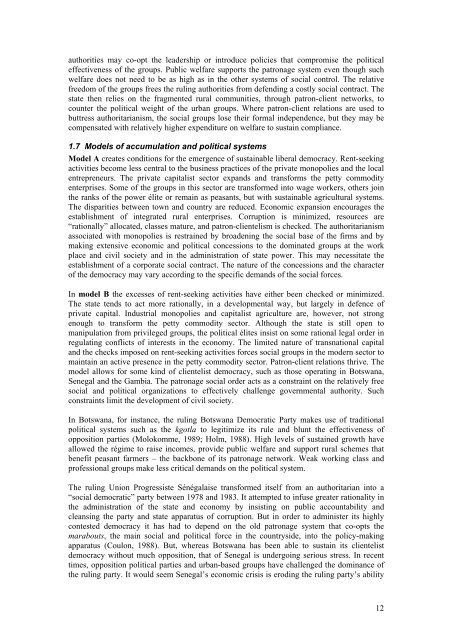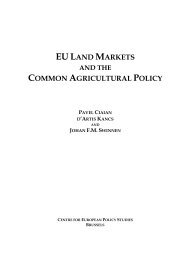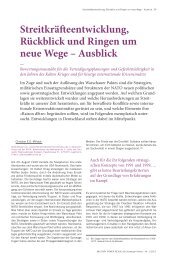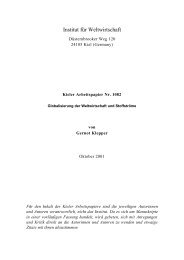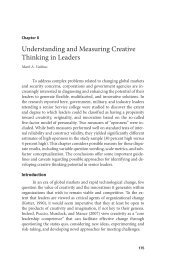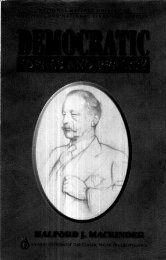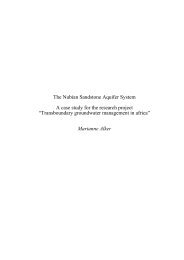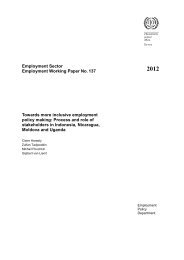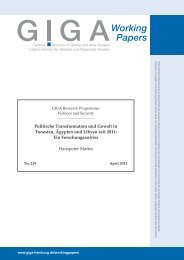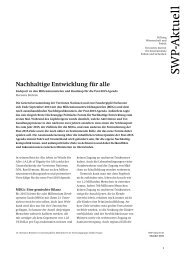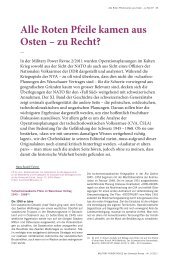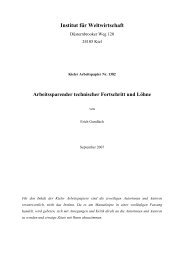Authoritarian Rule and Democracy in Africa: A Theoretical Discourse
Authoritarian Rule and Democracy in Africa: A Theoretical Discourse
Authoritarian Rule and Democracy in Africa: A Theoretical Discourse
Create successful ePaper yourself
Turn your PDF publications into a flip-book with our unique Google optimized e-Paper software.
authorities may co-opt the leadership or <strong>in</strong>troduce policies that compromise the politicaleffectiveness of the groups. Public welfare supports the patronage system even though suchwelfare does not need to be as high as <strong>in</strong> the other systems of social control. The relativefreedom of the groups frees the rul<strong>in</strong>g authorities from defend<strong>in</strong>g a costly social contract. Thestate then relies on the fragmented rural communities, through patron-client networks, tocounter the political weight of the urban groups. Where patron-client relations are used tobuttress authoritarianism, the social groups lose their formal <strong>in</strong>dependence, but they may becompensated with relatively higher expenditure on welfare to susta<strong>in</strong> compliance.1.7 Models of accumulation <strong>and</strong> political systemsModel A creates conditions for the emergence of susta<strong>in</strong>able liberal democracy. Rent-seek<strong>in</strong>gactivities become less central to the bus<strong>in</strong>ess practices of the private monopolies <strong>and</strong> the localentrepreneurs. The private capitalist sector exp<strong>and</strong>s <strong>and</strong> transforms the petty commodityenterprises. Some of the groups <strong>in</strong> this sector are transformed <strong>in</strong>to wage workers, others jo<strong>in</strong>the ranks of the power élite or rema<strong>in</strong> as peasants, but with susta<strong>in</strong>able agricultural systems.The disparities between town <strong>and</strong> country are reduced. Economic expansion encourages theestablishment of <strong>in</strong>tegrated rural enterprises. Corruption is m<strong>in</strong>imized, resources are“rationally” allocated, classes mature, <strong>and</strong> patron-clientelism is checked. The authoritarianismassociated with monopolies is restra<strong>in</strong>ed by broaden<strong>in</strong>g the social base of the firms <strong>and</strong> bymak<strong>in</strong>g extensive economic <strong>and</strong> political concessions to the dom<strong>in</strong>ated groups at the workplace <strong>and</strong> civil society <strong>and</strong> <strong>in</strong> the adm<strong>in</strong>istration of state power. This may necessitate theestablishment of a corporate social contract. The nature of the concessions <strong>and</strong> the characterof the democracy may vary accord<strong>in</strong>g to the specific dem<strong>and</strong>s of the social forces.In model B the excesses of rent-seek<strong>in</strong>g activities have either been checked or m<strong>in</strong>imized.The state tends to act more rationally, <strong>in</strong> a developmental way, but largely <strong>in</strong> defence ofprivate capital. Industrial monopolies <strong>and</strong> capitalist agriculture are, however, not strongenough to transform the petty commodity sector. Although the state is still open tomanipulation from privileged groups, the political élites <strong>in</strong>sist on some rational legal order <strong>in</strong>regulat<strong>in</strong>g conflicts of <strong>in</strong>terests <strong>in</strong> the economy. The limited nature of transnational capital<strong>and</strong> the checks imposed on rent-seek<strong>in</strong>g activities forces social groups <strong>in</strong> the modern sector toma<strong>in</strong>ta<strong>in</strong> an active presence <strong>in</strong> the petty commodity sector. Patron-client relations thrive. Themodel allows for some k<strong>in</strong>d of clientelist democracy, such as those operat<strong>in</strong>g <strong>in</strong> Botswana,Senegal <strong>and</strong> the Gambia. The patronage social order acts as a constra<strong>in</strong>t on the relatively freesocial <strong>and</strong> political organizations to effectively challenge governmental authority. Suchconstra<strong>in</strong>ts limit the development of civil society.In Botswana, for <strong>in</strong>stance, the rul<strong>in</strong>g Botswana Democratic Party makes use of traditionalpolitical systems such as the kgotla to legitimize its rule <strong>and</strong> blunt the effectiveness ofopposition parties (Molokomme, 1989; Holm, 1988). High levels of susta<strong>in</strong>ed growth haveallowed the régime to raise <strong>in</strong>comes, provide public welfare <strong>and</strong> support rural schemes thatbenefit peasant farmers – the backbone of its patronage network. Weak work<strong>in</strong>g class <strong>and</strong>professional groups make less critical dem<strong>and</strong>s on the political system.The rul<strong>in</strong>g Union Progressiste Sénégalaise transformed itself from an authoritarian <strong>in</strong>to a“social democratic” party between 1978 <strong>and</strong> 1983. It attempted to <strong>in</strong>fuse greater rationality <strong>in</strong>the adm<strong>in</strong>istration of the state <strong>and</strong> economy by <strong>in</strong>sist<strong>in</strong>g on public accountability <strong>and</strong>cleans<strong>in</strong>g the party <strong>and</strong> state apparatus of corruption. But <strong>in</strong> order to adm<strong>in</strong>ister its highlycontested democracy it has had to depend on the old patronage system that co-opts themarabouts, the ma<strong>in</strong> social <strong>and</strong> political force <strong>in</strong> the countryside, <strong>in</strong>to the policy-mak<strong>in</strong>gapparatus (Coulon, 1988). But, whereas Botswana has been able to susta<strong>in</strong> its clientelistdemocracy without much opposition, that of Senegal is undergo<strong>in</strong>g serious stress. In recenttimes, opposition political parties <strong>and</strong> urban-based groups have challenged the dom<strong>in</strong>ance ofthe rul<strong>in</strong>g party. It would seem Senegal’s economic crisis is erod<strong>in</strong>g the rul<strong>in</strong>g party’s ability12


